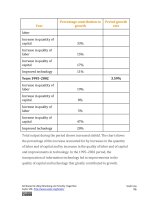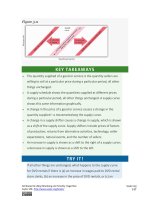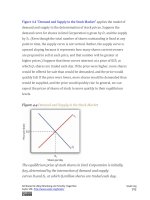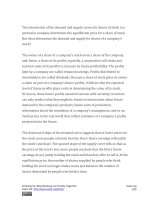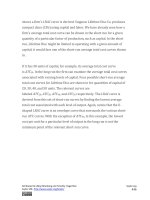Authors libby rittenberg 846
Bạn đang xem bản rút gọn của tài liệu. Xem và tải ngay bản đầy đủ của tài liệu tại đây (415.88 KB, 1 trang )
antitrust environment by appearing to reinvoke the doctrine of per se
illegality. In the government’s case against Visa and MasterCard, the
government argued successfully that the behavior of the two firms was a
per se violation of the Sherman Act.
The Sherman Act also aimed, in part, to prevent price-fixing, in which two
or more firms agree to set prices or to coordinate their pricing policies. For
example, in the 1950s General Electric, Westinghouse, and several other
manufacturers colluded to fix prices. They agreed to assign market
segments in which one firm would sell at a lower price than the others. In
1961, the General Electric–Westinghouse agreement was declared illegal.
The companies paid a multimillion-dollar fine, and their officers served
brief jail sentences. In 2008, three manufactures of liquid crystal display
panels—the flat screens used in televisions, cell phones, personal
computers, and such—agreed to pay $585 million in fines for price fixing,
with LG Display paying $400 million, Sharp Corporation paying $120
million, and Chunghwa Picture Tubes paying $65 million. The $400 million
fine to LG is still less than the record single fine of $500 million paid in
1999 by F. Hoffman-LaRoche, the Swiss pharmaceutical company, in a case
involving fixing prices of vitamin supplements.
Other Antitrust Legislation
Concerned about the continued growth of monopoly power, in 1914
Congress created the Federal Trade Commission (FTC), a five-member
commission that, along with the antitrust division of the Justice
Department, has the power to investigate firms that use illegal business
practices.
Attributed to Libby Rittenberg and Timothy Tregarthen
Saylor URL: />
Saylor.org
846
